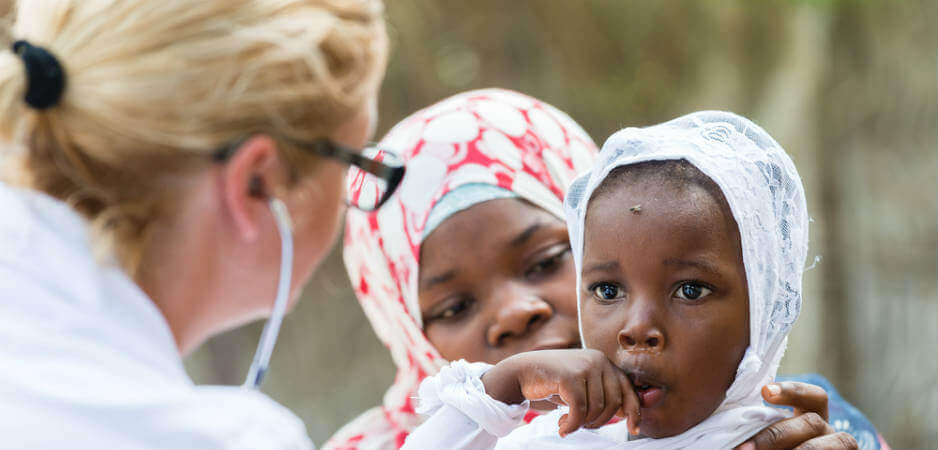Cuts to the CDC will disproportionately harm women’s health worldwide.
With the proposed cuts to the US Centers for Disease Control and Prevention’s (CDC) global epidemic disease activities, marginalized populations around the world will become more vulnerable to infectious disease outbreaks. It is unclear who will be the beneficiaries of this reduced funding, but it is clear who will pay the price — women.
The CDC plans to significantly scale back its infectious disease prevention and treatment programs. This means it will severely downsized or cut entirely many of the initiatives under the Global Health Security Agenda (GHSA). Programs in 39 out of the 49 countries where the CDC operates will no longer be equipped with the resources and strategies they need to prevent, detect and respond to threats of infectious disease. In fiscal year 2015, funding from the GHSA was awarded to the CDC in reaction to the Ebola crisis in West Africa. The affected countries within that region lacked the proper means to prevent the spread of the disease, and GHSA funding became crucial for health capacity building in developing nations.
Public health emergencies affect men and women differently. This has been seen during the 2014 Ebola crisis when 75% of Ebola deaths in Liberia were women. Since the majority of jobs at health-care clinics — nurses, laundry workers, cleaners and clinicians — were filled by women, they are at a higher risk of exposure. In this sense, women were truly at the frontlines of a battle against Ebola.
It has been more than two years since the official declaration ending the Ebola crisis in West Africa, but the devastating aftermath the epidemic had on women’s health will linger for decades. The World Bank reported that maternal mortality levels in Guinea, Liberia and Sierra Leone will exponentially increase to levels last seen 20 years ago due to the disproportionately high numbers of health workers that died during the Ebola crisis. In this instance, a public health emergency negated several decades of progress made in the field of maternal and children’s health. If the CDC is not sufficiently funded to help prevent future viral outbreaks, the status of global women’s health could continue to deteriorate.
The Zika outbreak of 2015 to 2016 was unique in how it affected women, particularly pregnant women. Though the Zika virus was not deadly for the women who were infected, the lasting effect of the epidemic will be felt for decades as thousands of babies were born with microcephaly as a result. In many of the communities in Latin America and the Caribbean where the Zika virus was most prevalent, mothers are now taking care of children who will suffer from lifelong disabilities without having sufficient resources or information to do so.
The effects of these outbreaks do not simply end when a state of emergency is called off. Their effects are felt for years to come, and again it is women who will bear the brunt of the hardship in the aftermath of these outbreaks. As evidenced by the Ebola and Zika, a lack of preparedness will negatively harm not only the women who become infected during an epidemic, but the generations that follow and negate years of medical progress.
Though the White House recently released a report describing the ways in which the GHSA has been a success, the administration does not seem willing to keep its commitment to invest in global health security. By slashing the CDC’s budget for detecting and preventing an infectious disease outbreak, the United States would be put in a position of spending more money to respond to an outbreak than it would be by putting in measures to prevent one. Investing in pandemic preparedness programs is not simply a moral imperative for the United States to protect populations in developing nations. From a national security standpoint, it is irresponsible to decrease funding for health security programs; infectious disease can cross borders indiscriminately, putting Americans at risk of a viral outbreak.
The proposed cuts to CDC funding has alarmed global health organizations for a host of reasons, as seen in an open letter to US Health and Human Services Secretary Alex Azar, signed by over 200 health security groups. However, by not acknowledging how these budget cuts will affect women differently, the status of women’s health could regress to an unacceptable status across the globe. The United States should not only maintain current levels of GHSA funding, but should expand its financial commitment to pandemic preparedness to prioritize global health security, not just to protect the health of its own citizens, but for the well-being of the women of the world.
*[Young Professionals in Foreign Policy is a partner institution of Fair Observer.]
The views expressed in this article are the author’s own and do not necessarily reflect Fair Observer’s editorial policy.
Photo Credit: Avatar_023 / Shutterstock.com
Support Fair Observer
We rely on your support for our independence, diversity and quality.
For more than 10 years, Fair Observer has been free, fair and independent. No billionaire owns us, no advertisers control us. We are a reader-supported nonprofit. Unlike many other publications, we keep our content free for readers regardless of where they live or whether they can afford to pay. We have no paywalls and no ads.
In the post-truth era of fake news, echo chambers and filter bubbles, we publish a plurality of perspectives from around the world. Anyone can publish with us, but everyone goes through a rigorous editorial process. So, you get fact-checked, well-reasoned content instead of noise.
We publish 2,500+ voices from 90+ countries. We also conduct education and training programs
on subjects ranging from digital media and journalism to writing and critical thinking. This
doesn’t come cheap. Servers, editors, trainers and web developers cost
money.
Please consider supporting us on a regular basis as a recurring donor or a
sustaining member.
Will you support FO’s journalism?
We rely on your support for our independence, diversity and quality.






